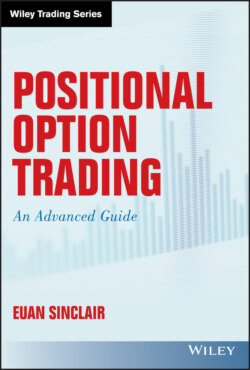Читать книгу Positional Option Trading - Euan Sinclair - Страница 17
Aside: Alpha Decay
ОглавлениеThe extinction of floor traders is an example of a structural shift in markets destroying a job. Similar to most people, traders tend to think that their skills are special, and their jobs will always be around. This isn't true. The floors have gone. Fixed commissions have gone. Investment advisors are being replaced by robo-advisors. There are fewer option market-makers, each trading many more stocks than in the past. Offshoring will definitely come to trading, and it is quite possible that a market structure such as a once-a-day auction could replace continuous trading.
But as well as these structural changes, the alpha derived from market inefficiencies (as opposed to the beta of exposure to a mispriced risk factor) doesn't last forever. Depending on how easy it is to trade the effect, the half-life of an inefficiency-based strategy seems to be between 6 months and 5 years. Mclean and Pontiff (2016) showed that the publication of a new anomaly lessens its returns by up to 58%. And publication isn't the only thing that erodes alpha. Chordia et al. (2014) showed that increasing liquidity also reduces excess returns by about 50%. Sometimes the anomaly exists only because it isn't worth the time of large traders to get involved. A similar effect is that the easy access to data will kill strategies. Sometimes the alpha isn't due to a wrinkle in the financial market. It is due to the costs of processing information.
Just as some traders will profit by using a stupid idea like candlestick charting, some traders will succeed for a while with an overfit model. I'm in no way using this to condone data-mining, but we can learn a valid lesson from this. As Guns and Roses pointed out, “nothing lasts forever.” Lucky strategies will never last but even the best, completely valid strategy will have a lifetime. So, when you are making money don't think that being “prudent” is a good idea. The right thing to do is to be as aggressive as possible. Amateurs go broke for a lot of reasons, but professionals often suffer in bad times because they didn't fully capitalize on good times, instead thinking that making steady but small profits was the best thing to do.
They also spend too much in good times, forgetting that they won't last. I've had a floor trader tell me about his new Ferrari about an hour before laughing about the stupid spending habits of NFL and NBA players (the last I heard he was selling houses). Many times, traders have short careers because a valid strategy dies. Amateurs blow up, but professionals don't allow for alpha-decay. For example, many floor traders didn't survive the death of the open-outcry pits. Their edge disappeared, and their previous spending habits left them with little. (In this case “trickle-down” economics was correct, as profits from market-making trickled down to prostitutes, strippers, and cocaine dealers. At least it wasn't wasted.)
